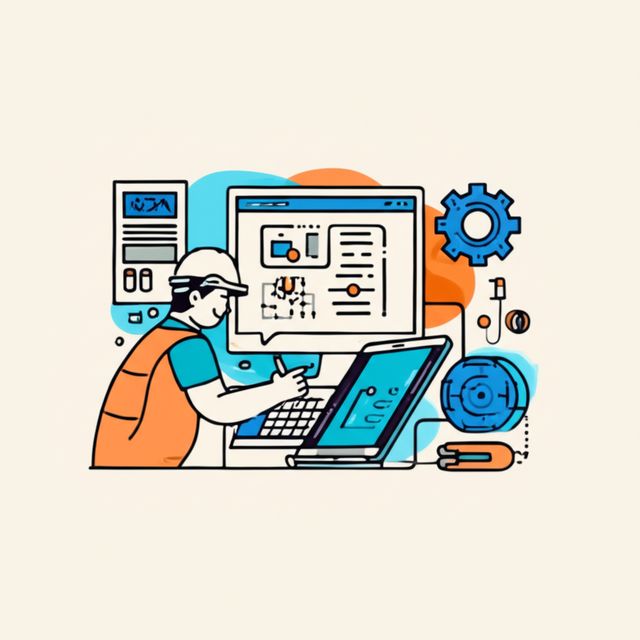Mechanical Design Engineer
Mechanical Design Engineers are responsible for designing and developing a wide range of mechanical systems, components, and products. They work with a variety of materials, including metals, plastics, and composites, to create products that meet specific functional and aesthetic requirements. Mechanical Design Engineers typically have a strong understanding of physics, mathematics, and engineering principles, as well as a solid foundation in computer-aided design (CAD) software.
Becoming a Mechanical Design Engineer
There are several paths to becoming a Mechanical Design Engineer. One common path is to earn a bachelor's degree in mechanical engineering. Other options include earning an associate degree in mechanical engineering technology or completing an apprenticeship program. After completing your formal education, you will need to gain experience working in the field. Many Mechanical Design Engineers start their careers as drafters or design assistants before moving into more senior roles.
Skills and Knowledge
Mechanical Design Engineers need a strong foundation in the following skills and knowledge areas:
- Physics
- Mathematics
- Engineering principles
- Computer-aided design (CAD) software
- Materials science
- Manufacturing processes
- Problem-solving
- Communication skills
- Teamwork skills
Career Growth
Mechanical Design Engineers can advance their careers by taking on more responsibilities and developing new skills. Some Mechanical Design Engineers may eventually move into management roles, while others may choose to specialize in a particular area of design. The field of mechanical design is constantly evolving, so there are always new opportunities for learning and growth.
Transferable Skills
The skills and knowledge that Mechanical Design Engineers develop can be transferred to a variety of other careers. For example, Mechanical Design Engineers can work as product design engineers, product development engineers, or manufacturing engineers. They can also work in fields such as robotics, automotive design, and aerospace engineering.
Day-to-Day Responsibilities
The day-to-day responsibilities of a Mechanical Design Engineer can vary depending on the industry and the specific company. However, some common responsibilities include:
- Developing new product designs
- Modifying existing designs
- Creating technical drawings and specifications
- Working with other engineers and designers
- Testing and evaluating product prototypes
Challenges
Mechanical Design Engineers face a number of challenges in their work. These challenges can include:
- Meeting customer requirements
- Staying up-to-date on the latest technology
- Working within budget constraints
- Solving complex design problems
Projects
Mechanical Design Engineers may work on a variety of projects throughout their careers. These projects can range from small, simple designs to large, complex systems. Some examples of projects that Mechanical Design Engineers may work on include:
- Designing a new type of engine
- Developing a new medical device
- Creating a new product for the consumer market
- Designing a new manufacturing process
Personal Growth
Mechanical Design Engineers have the opportunity to experience significant personal growth throughout their careers. This growth can come from taking on new challenges, developing new skills, and working with a variety of people. Mechanical Design Engineers can also find personal growth through their involvement in professional organizations and continuing education.
Personality Traits and Interests
Successful Mechanical Design Engineers typically have the following personality traits and interests:
- Strong analytical skills
- Excellent problem-solving skills
- Good communication skills
- Ability to work independently and as part of a team
- Interest in science and technology
- Attention to detail
- Creativity
Self-Guided Projects
Students who are interested in becoming Mechanical Design Engineers can complete a number of self-guided projects to better prepare themselves for the role. These projects can include:
- Building a simple machine
- Designing a new product
- Creating a technical drawing
- Working with a CAD software program
- Taking an online course in mechanical engineering
Online Courses
Online courses can be a great way to learn about the field of mechanical design and develop the skills needed to be successful in this career. Online courses can provide students with the flexibility to learn at their own pace and on their own schedule. They can also be a more affordable option than traditional college courses.
Online courses can teach students about a variety of topics related to mechanical design, including:
- Engineering principles
- CAD software
- Materials science
- Manufacturing processes
- Product design
- Project management
In addition to providing students with the knowledge and skills they need to be successful in this career, online courses can also help students develop their problem-solving skills, critical thinking skills, and communication skills. These skills are essential for success in any engineering role.
While online courses alone may not be enough to prepare someone for a career as a Mechanical Design Engineer, they can be a helpful learning tool to bolster the chances of success for entering this career. Online courses can provide students with the foundation they need to succeed in a traditional college program in mechanical engineering or in an apprenticeship program.


